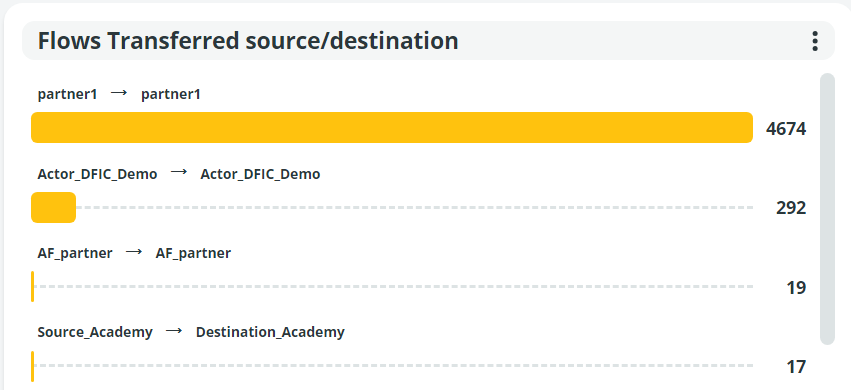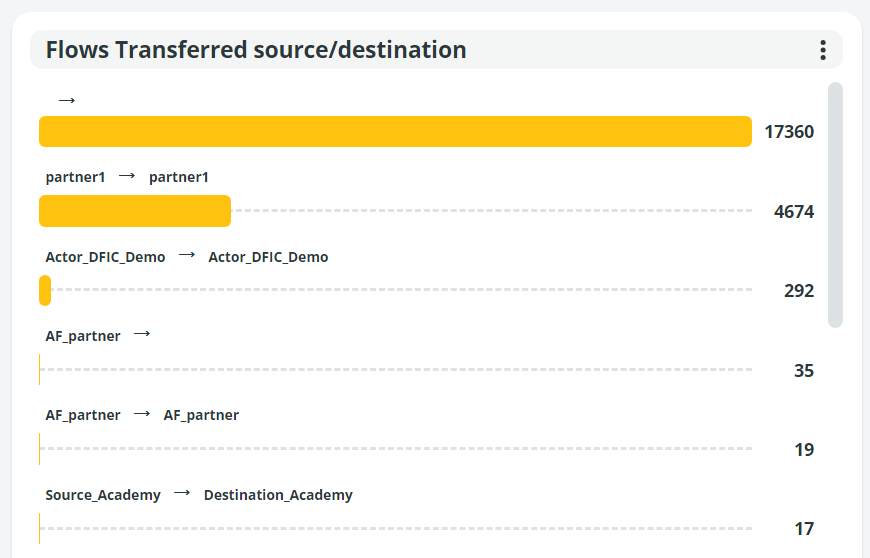Flows Transferred Source/Destination
The Flows Transferred Source/Destination card shows the number of flows transferred from each source to each destination.
Refer to the Adding Cards page for detailed steps.

The graph shows all sources and destinations separated by an arrow, together with the number of transfers performed. To the left of the arrow is the Actor that performed the transfer. To the right of the arrow is the Actor that received the data.
If you move the mouse over the bar, the number of flows in error and success status is displayed.

Clicking on each chip opens the Flows window, which lists all the flows of the selected group. The Flows window is equipped with a toolbar to easily navigate through results. Columns can be configured by clicking the  icon on the top-right corner. Columns cannot be sorted but the list can be exported in CSV format by clicking the EXPORT button on the top left corner of the Flows window.
icon on the top-right corner. Columns cannot be sorted but the list can be exported in CSV format by clicking the EXPORT button on the top left corner of the Flows window.
Clicking the 3 dots button in the upper right corner of the card, the following options will appear:
- Settings: Define if incomplete flows must be shown or not. To have this detail, set the Show incomplete flows option to ON and click the APPLY button.
Note that by default this option is not enabled. When enabled, the graph will display incomplete flows without indication of the Actors and only with the arrow, as in the following figure.

- Filter: Filter the data displayed on the card according to the following criteria:
- From - To: Select the time range in which to collect data. Click the APPLY button to confirm each date selected.
- Filename: Enter the name of the file transferred from a source to a destination. The specified string will be searched in all filenames, i.e. writing march will return all filenames that contain march anywhere in the filename. The graph will list all flows containing the filename or string entered, showing both the source and the destination of each transfer.
- Protocol: select one protocol choosing among those listed. Once the filter is applied, the card will display only the results that match the selected criterion and a funnel icon will appear to indicate that the results are a subset of the total.
- Outcome: select SUCCESS, FAILURE, or ERROR. Once the filter is applied, the card will display only the results that match the selected criterion.
- Source: If you want to know all the flows started from a specific source, enter the name of the source in this field.
- Destination: If you want to know all flows that have arrived at a specific destination, enter the name of the destination in the field.
- Source Queue: If you want to know all the flows started from a specific source queue, enter its name in this field.
- Destination Queue: If you want to know all flows of a specific destination queue, enter the name of the destination queue in the field.
In the Filters window, to remove an option, click the red X.
The RESET button restores default settings.
In the Flows Transferred Source/Destination card, when a filter is applied, a funnel icon appears in the upper right corner to indicate that the results shown are a subset of the total. Clicking the funnel icon, all applied filters will be listed. To open the Filters window and edit them directly, click the pencil icon.
You can create as many cards as you need to meet the number of criteria you require. For example, you can create a card with the total number of flows transferred and another with flows in ERROR; or a card with all flows transferred to all destinations and another with flows transferred to a specific destination. And so on.Tip:
In the Filters window, editable fields (e.g. Filename, Source, Destination, etc.) do not accept wildcard characters. These fields are case insensitive.
- Color: Select a different color for the external border of the card. Click the RESET button to restore default colors.
- Remove: Select the option to remove the card. Note that the card will be removed without any further prompting.
Updated about 2 months ago
